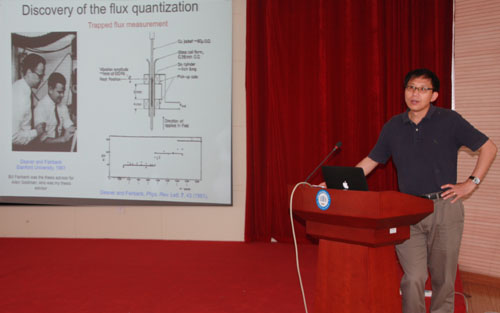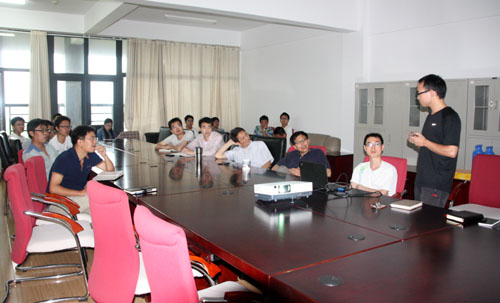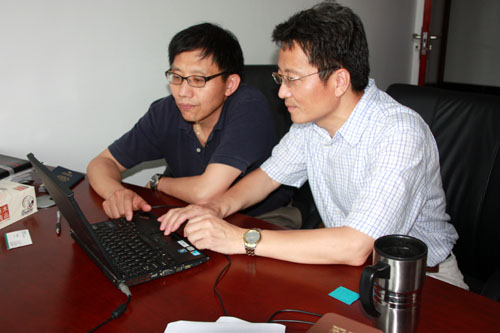Prof. Ying Liu, from Pennsylvania State University, was invited by the High Magnetic Field Colloquium of the High Magnetic Field Laboratory, Chinese Academy of Sciences (CHMFL) and gave a wonderful lecture entitled "Destructive regime, superconducting fluctuations, Little-Parks-de Gennes effect in doubly connected mesoscopic superconductor" on July 17th, 2015. Most professors and students of the Material Science Division attended the lecture.
Prof. Liu started by talking about the discovery of flux quantization, and then introduced the macroscopic quantum effect of doubly connected mesoscopic superconductor (or a small hollow superconductor). Prof. Liu designed an experiment to measure the magnetic field dependent resistance of a super thin hollow superconducting wire, and observed an interesting phenomenon called “Destructive Regime” when the magnetic field equals to a half flux quantum, which confirmed the theoretical prediction of a French scientist in 1981. In addition, he introduced some new research progress on Little-Parks-de Gennes effect, quantum phase transition and superconducting quantum fluctuations et. al. The lecture aroused great interests from researchers and students, and they discussed with Prof. Liu about hot topics in condensed matter physics such as mesoscopic superconducting device.
Prof. Liu attended the group meeting of Prof. Mingliang Tian in CHMFL, and listened to the presentation about transport properties of three-dimensional Dirac semimetal given by a graduate student. He discussed about the experimental details, and provided insightful suggestions for the forthcoming experimental works. Prof. Liu also discussed about new results of oxide with other young researchers and students.
Prof. Liu received his Ph. D. in Physics from University of Minnesota in 1991. He joined Department of Physics, Pennsylvania State University in 1994 and became a full Prof. in 2005. His main research focuses on condensed matter physics and quantum material physics. He has accomplished world-wide acknowledged success in his research fields including unconventional superconductivity, quantum phase transition, nano-physics, and strong correlated system et. al. He has published over 100 papers in peer-reviewed journals, including Nature (1 article), Nature physics (2 articles), Nature Material (1 article), Nature Communications (1 article), Science (4 articles), PNAS (3 articles), and PRL (10 articles). He received a Career Award from NSF and a Young Scientist Award (B type) in China, and is a Chang Jiang Visiting Prof. in Zhejiang University.
|
 |
|
Lecture |
|
 |
|
Group meeting |
|
 |
|
Discussion |